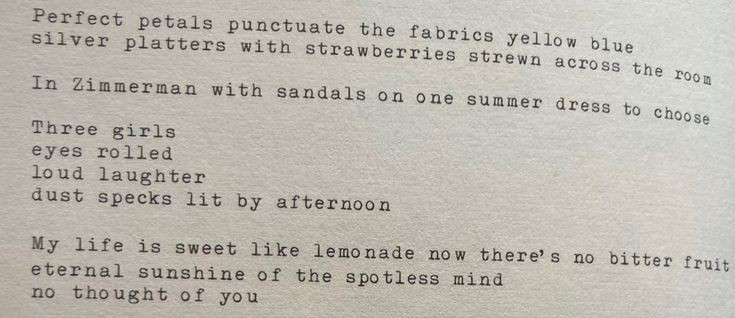To Love by Doing Nothing
January 11, 2024
Book Review by Cordelia Shan:
Violet Bent Over Backward Over the Grass
by Lana Del Rey
Violet Bent Backwards Over the Grass is a unique audio experience, a fusion of poetry and music, created and narrated by the renowned American singer-songwriter, Lana Del Rey. Best known for her dreamy and melancholic music, Del Rey ventures into a new artistic realm with this spoken-word collection, accompanied by the hauntingly beautiful instrumentals of Jack Antonoff. In this essay, we will delve into Lana Del Rey's role as a spoken-word performer, analyzing her voice, her choice of words, and her intended audience by examining three distinct poems: "LA Who am I to Love You?" "My Bedroom is a Sacred Place Now," and "Salamander."
First and foremost, Lana Del Rey possesses a captivating and soothing voice that suits the role of a spoken-word performer impeccably. The whole production has a sense of laziness in Del Rey’s voice, which reminds listeners of waking from a nap on a sunny summer afternoon, under the shed, with no rain but a sky full of clouds. The ambient sounds of rain, city life, nature, the sky, aircraft, and highways further immerse the audience into the vivid imagery conveyed through Del Rey's words as listeners are invited to partake in a sensory experience throughout the performance. Her husky voice, with its effortless style, exudes an unrushed and melancholic quality, evoking a sense of reclining on warm grass, which is profoundly relaxing for the audience. Del Rey's low-key tone and slow-paced reading is renowned for its raw emotion, authenticity, and a touch of vintage charm.
Consequently, the words of Del Rey, when paired with her voice, become deeply introspective and contemplative. She explores themes of nostalgia, love, and the relentless passage of time. Her smooth delivery and relaxed, whispery tone, soft and with no force, beckons listeners to immerse themselves in her thoughts and emotions. Like listening to a friend on the phone, Del Rey creates a safe space for her listeners to be heard and to be comforted. In the opening poem, “LA Who am I to Love You?” a love letter to LA to express her loneliness, “I” is portrayed as an adoptee, begging in a pitiful tone for returning affection. She writes,
LA! I’m pathetic
but so are you
can I come home now?
Daughter to no one
table for one
...I never had a mother
will you let me make the sun my own now...
I am lonely LA
can I come home now?
...
so just love me by doing nothing.
To enhance the performance, her voice carries a palpable undercurrent of anxiety and tension by stressing the vowel in “home,” “lonely,” “now,” and “own,” where she reads in a higher but tight pitch. The stress of the words and tones all together sound like crying in a washroom alone and speaking to oneself that many people can relate to.
Lana Del Rey is a fabulous storyteller. In her work, “My Bedroom is a Sacred Place Now,” she paints a lucid character possessing strong self-awareness while writing a letter to an ex-friend or lover, “when I wrote you my last letter / ...you told me that I didn’t know who I was, but I do...”. Del Rey builds up this space for her story to grow organically, “my bedroom is a sacred palace now that there are children at the end of my bed / telling my stories about the friends that they pretend to hate...” She also has no shame but uses many directed emotional words, like in the poem, “Salamander,” where she drops the lines painting a picture of someone who is longing for love and understanding:
I love you
but you don’t understand me
you see I’m a real poet
my life is my poetry
my lovemaking is my legacy...
Rather than simply evoking strong emotions with words like “love,” “hate,” “real,” it’s her delivery that deeply moves the audience, allowing us to appreciate the rich tapestry of sensations she generously shares. Del Rey's poems resonate with layered and profound emotions, all conveyed through her signature sultry and ethereal voice. Some listeners approach this audiobook with the sincere intent of unraveling the enigma of Lana Del Rey. However, they may overlook that writing is a form of creation wherein writers fashion fictional characters. Even though the poems frequently touch on themes of isolation, there remains a profound sense of empathy within her words, so that listeners who can relate to her experiences feel heard and seen.
Beyond her fan base, Lana Del Rey's audiobook welcomes a diverse audience. While devoted fans relish the chance to experience her artistry in this new form, the universal themes of her poetry— such as isolation— ensure that a broader audience can find solace and connection in her words. Del Rey's lyrical and introspective storytelling speaks to the core of human emotions, making her audiobook a relatable and resonant experience.
"Violet Bent Backwards Over the Grass" represents a compelling exploration of Lana Del Rey's talent as a spoken-word performer and storyteller. Her unique voice, coupled with evocative words and universal themes, create an immersive experience that transcends her music career. Del Rey invites listeners to embark on a journey of introspection, empathy, and connection, making this audiobook a treasure for both her fans and wider audiences alike.
Cordelia Shan is made in China with various East Asian ingredients, based in Toronto, ON. A reader, creator, writer, and translator, she is currently marinating in Creative Writing at OCAD University. She enjoys reading books, eating good food, writing, making a podcast, and listening to jazz.





